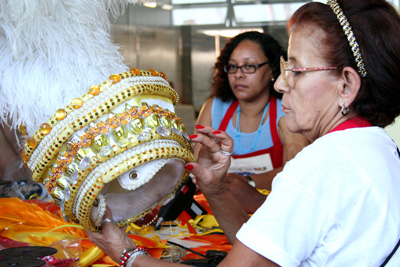Carnival sets an example of formalization

Disclosure Amebras
A survey by Sebrae shows that the formalization of Individual Microentrepreneurs (MEI) in ten activities related to carnival was higher than the average in the four capitals most benefited by Momo's revelry. The largest Brazilian party, which attracts looks from around the world and millionaire investments, also has a direct impact on reducing informality in the country.
According to the survey, released by Sebrae in early February, until November 2012, the segments for renting stages and structures, independent singer, makeup artist, food vendors, boatman, potter, clothing customizer, seamstress, shoe maker and artisan in plasterboard had an average growth of 76% in São Paulo, Rio de Janeiro, Salvador and Recife. The total number of self-employed entrepreneurs, who earn up to R $ 60 thousand per year, increased by an average of 73% in these capitals.
"The revelry of informality in the carnival is over," said the president of Sebrae, Luiz Barretto. “Samba schools, which even receive public funds, prefer to hire professionals with a National Register of Legal Entities (CNPJ) and invoice. Therefore, formalization is essential, even to generate other business opportunities throughout the year. ”
In Rio de Janeiro, for example, the preparation of costumes for the samba school parade or for street party revelers has been encouraging the formalization of entrepreneurs. Until November 2012, the number of MEIs that customize clothes in the capital of Rio de Janeiro increased by 128%.
During the carnival period, Thiago Diogo, drum master at Porto da Pedra, works day and night. In addition to training the samba school drums, he does shows, weddings and parties. Diogo was formalized in December 2011, when he saw the legal benefits and recorded the losses due to the lack of registration. He says he even refused four invitations in a month to perform with the drummers in the low season. “With a company, there is no game. You either present the invoice or lose your job ”, he explains.
Paulo Ferraz has been working at the carnival for 20 years. Three years ago, he decided to formalize the company that provides maintenance services for floats in Cidade do Samba. For Ferraz, the formalization tripled the volume of business and also reduced the price of parts by about 40% when buying directly from the supplier and no longer from the dealer, thanks to the CNPJ.
In Salvador, for the 2013 carnival, more than 5 licenses were made available for vending points on the official circuits - Batatinha, Dodô and Osmar. Each licensed point directly involved four workers. The representative associations of street vendors estimated that more than 40 thousand street vendors, between licensed and non-licensed, performed at the carnival at more than 10 commercial points. In the last four years, Sebrae trained more than 7 thousand entrepreneurs in Salvador (average of 1,8 thousand per year), exclusively for the period.
Information from Agência Sebrae de Notícias - ASN



